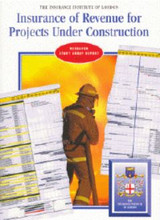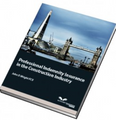 Loading... Please wait...
Loading... Please wait...Categories
 New Products
New Products
-
$130.00 (inc GST) $118.18 (ex GST)
-
$195.00 (inc GST) $177.27 (ex GST)
-
$26.95 (inc GST) $24.50 (ex GST)
-
$26.95 (inc GST) $24.50 (ex GST)
-
$380.95 (inc GST) $346.32 (ex GST)
Our Newsletter
- Home
- Insurance
- Marine & Energy
- Insurance of Revenue for Projects under Construction
- Home
- Insurance
- Construction & EAR
- Insurance of Revenue for Projects under Construction
Insurance of Revenue for Projects under Construction
Product Description
Insurance Institute of London (IIL) Research Study report on this subject commonly referred to as Delay in Start-up insurance (DSU) or Advance Loss of Revenue insurance (ALOP). The book makes this complex subject accessible in a way that will be helpful to the new student but also of value to the experienced practitioner. The insurance of revenue for projects under construction has gained significant importance over the last decade or so; partly due to the increasing dependence on private sector finance. Protecting the revenue stream with insurance is therefore increasingly regarded as of equal importance, if not of greater importance, than protecting the assets themselves.
Authors: IIL Research Study Group 254
ISBN: 0900493828
Published: IIL, September 2003
Binding Format: Soft cover
Thye book deals with all aspects of the subject from underwriting to claims. It explains how revenue arises on project as diverse as power stations and hospitals, roads and bridges, and oil and gas producing facilities. The basic principles of insuring revenue are explained including calculation of gross profit, evaluating variable charges and fixed charges and the connection with the underlying material damage cover. The difficulty of distinguishing insured delays from uninsured delay is outlined and the way the deductible is applied and the indemnity period calculated explained. The policy wording is illustrated and explained and actual claims examples are included.
Marine cargo insurance and related delay insurance is fully explained.
This book was written by a team experienced in the handling this class of insurance in the London and international markets and is expected to become the standard source of guidance in the management of this form of insurance world wide.
The Insurance Institute of London (IIL), by far the largest in the UK, was established in 1907 and today has over 17,500 members. IIL's objective is to raise professional knowledge of those working in insurance and assist them in their career development through a combination of lectures, an annual journal and facilitation of Research Study Groups (RSG). RSG's are formed to research specialised areas of insurance. They are lead and their members are drawn from those with acknowledged expertise in the particular areas being researched. The comprehensive reports subsequently produced and published are highly regarded and well received both in London and around the insurance world.












